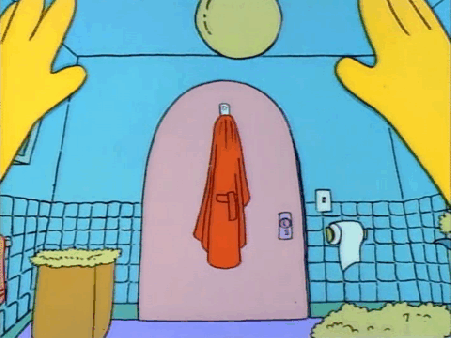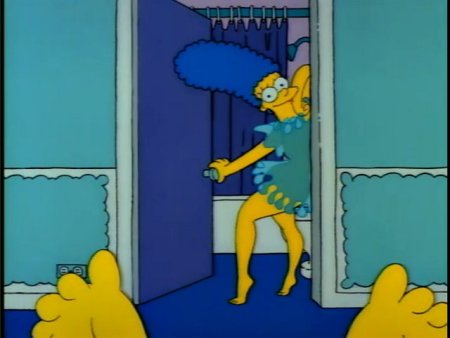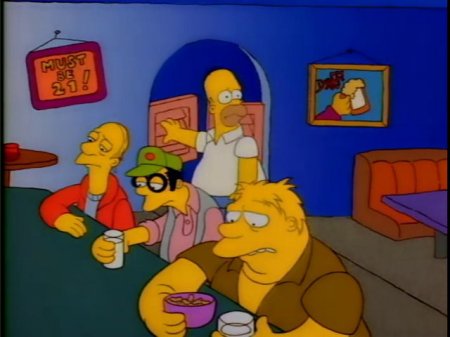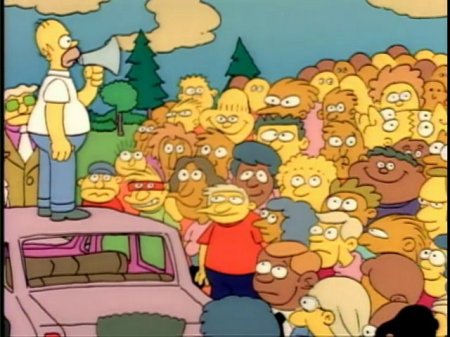7. The Call of the Simpsons
- Pretty strange that the very first “Shut up, Flanders” actually came from Bart complaining about Rod.
- Albert Brooks really is the perfect Simpsons guest star, all of his characters are wonderful smooth-talking manipulators in some form or fashion. Big Bob isn’t as infamous as Jacques or Hank Scorpio, but he totally dominates the entire first act, buttering Homer up even after all but telling him he’s a broke loser who can only afford his shittiest RV (“Simpson, you’ll never own a better RV, and I don’t mean that in a good way. I mean, literally, buddy, this is for you, you know. It’s this or a wagon.”)
- “The Simpsons have entered the forest.” Lisa immediately nailing her deadpan lines.
- While Homer and Bart are out starving and/or freezing to death in the wilderness, the Simpson women fare much better for themselves, making a little home-away-from-home. Not only do they use a large branch as a broom, but Marge also arranges live squirrels as little knick-knacks, as they just stand there motionless, making peace in their new lot in life as decorative pieces in this deluded housewife’s makeshift outdoor home. This episode is silly.

- The rabbit getting flung out of Homer’s snare is the best joke of the entire show, and even though the visuals are great, the sound design is what really makes it tremendous.
- I watched Grizzly Man a couple months ago, and I felt kind of bad that I was thinking of this scene by the ending:

- This is the first episode to lampoon the vile phenomenon that is the media circus, and three decades later, it still feels like fresh satire.
- It’s such a small moment, but I love when a reporter asks Marge if her marital relations with “Bigfoot” are “brutish,” she smiles briefly before asking if her answer will be on TV.
- The ending where a team of scientists can’t tell if Homer is man or monster still feels dumb to me, but Marge parroting one of the eggheads, calling Homer “my brilliant beast” is pretty sweet.
- In-between Albert Brooks at the beginning and the media circus at the end, the middle lost in the woods chunk isn’t really that interesting, outside of a few choice great moments like the rabbit in the snare. Homer and Bart’s woodland shenanigans mostly feel like they’re out of a Nickelodeon cartoon (well, except for Bart proposing he and his father hang themselves), and I have no real sentiment toward the Maggie/bears storyline. This is definitely my least favorite of season 1.

8. The Telltale Head
- Our first official Krusty line is him screaming “KILL HIM!!” at a young child as part of a vicious, bloodthirsty mob. Season 1 really is pretty hardcore.
- “We’ll die together, like a father and son should.”
- “All these questions… is a little blind faith too much to ask?!”
- I always loved the sequence of Bart getting undressed in the hall, it’s so well executed. Speaking of, it’s pretty incredible how quickly the animation quality has shot up from the first few episodes to now. By the end of the season, the show was nearly firing on all cylinders visually, leading right into season 2, where things only got even sharper.

- I like the two instances of Homer and Bart echoing each other through the episode. First is outside of church, when the two are confronted by Marge, who asks if they were going to sneak a walkman into church (Bart) or was planning on staying in the car to listen to the game (Homer), both sheepishly reply, “Maybe,” signaling to the likemindeness of the two character. Later, Homer offers Bart a kindly aphorism, “Share the wealth, that’s what I always say!” Bart parrots his father in offering to pay for the bullies’ Squishees, only to find they stole a bunch of other stuff as well. With Bart’s admiration for Homer in place, we see why his “advice” on how being popular and accepted sunk in with the kid so much.
- The best one-off character of the season is the Candy Most Dandy owner. This is a man who hates children.

- Homer is agog at reading about “The Stealth Bowler,” a bowling ball with a liquid center. Curious if that’s actually a real thing, a quick Google search suggests no. According to a random blog post specifically referencing this episode, “A liquid centre in a bowling ball would tend to retard the rolling motion of the ball, decreasing its power and accuracy simultaneously.”
- I love how when Bart grabs Snowball II to muffle the cat’s scream, we hear only one half of its screech, then when he lets it go outside, we hear the second half, almost like he paused and unpaused it.
- In 1990, the idea of a populous getting whipped into a violent frenzy over the desecration of a statue of a problematic historical figure was probably a very amusing exaggeration at the time. In 2020, however… We also get a small taste of the dismissal of actual history for embellished idol worship with the Jebediah Springfield documentary, where the narrators offhandedly mentions how new evidence suggests that Jebediah was most likely killed by the infamous bear, rather than vice-versa.
- I have no idea why they posed Homer so daintily sitting on the couch, but I love it all the same.

- It’s pretty amazing thinking back on how concerned parents and nagging media groups were coming down on this show for Bart being a bad role model for children, while in the show, he’s really just a believable little kid. He’s a bit of a brat, but despite his snark, he still has great capacity for shame (“Bart the Genius”) and empathy (“Moaning Lisa”). This episode almost plays out like an after-school special of Bart stepping in with the wrong crowd and learning his lesson by the end. Hell, the most dangerous semi-imitable prank he pulls in season 1 is dropping a cherry bomb in the toilet, and his punishment for it is literal deportation and being physically abused and tortured by two dirty Frenchmen.
9. Life on the Fast Lane
- I like how even Bart can’t help but admit that Lisa’s birthday macaroni art is pretty damn impressive.

- “Good morning, consumers. The Springfield Mall is now open for your spending needs.”
- Among the list of Homer’s awful birthday presents Patty & Selma bring up, they mention “the Connie Chung calendar.” At the time, Chung was a CBS news reporter. Was she viewed as an attractive woman from television, or is that a Connie Chung calendar exits at all the gag? I’m not entirely sure.
- We get a perfect duality of Bart at the dinner scene. He bickers with Lisa about which gift Marge loves most, where Lisa touches a nerve that she hasn’t even used Bart’s perfume. Bart then asks his mother with genuine concern why this is. When Marge quickly bullshits the excuse that she’s saving it for a special occasion, Bart is quick to fire back (“What the hell are you talking about? There’s gallons of it!”) Marge then quickly covers her ass again (“But this occasion is already so special, if we make it any more special, we might end up making it less special.”) The naive kid that he is, Bart buys this, and rubs it in Lisa’s face, who simply groans, “Oh, brother.” What a lovely scene.
- The bowling ball absolutely crushing the cake is so well done, and I love how quickly the waiters book it after it happens. There’s not even like an awkward pause, they just dart off.

- “The holes were drilled for your fingers!” “I wanted to surprise you! I couldn’t chop your hands off and bring it to the store, could I?”
- I love how casually Marge admits to the bowling alley attendant that she’s only there out of spite.
- Albert Brooks as Jacques is brilliant, of course. I love the interplay between him and Julie Kavner, as it’s clear that they recorded a lot of their scenes together. There was a bonus feature on the season 1 DVD of outtakes with the two of them, where Brooks kept ad-libbing, cracking up Kavner and the rest of the crew. I can’t find it online anywhere, but if you’ve got the DVD, do yourself a favor and rewatch it.
- Homer tending to the kids feels so real, with him trying to put on a brave face, but family time quickly proves awkward for him (“Does the time always drag like this?”) But he does his damn best; his nighttime checklist and the four handing off the pizza box to chuck in the trash is pretty adorable.
- “I’m a married woman!” “I know, I know. My mind says stop, but my heart, and my hips, cry proceed!”

- Another perfect first appearance: Helen Lovejoy, the self-admitted “gossipy wife of the minister.” She’s the perfect false-faced “friend,” claiming to be well intentioned while clearly being anything but. Jacque’s right, “let’s hope something runs over her.”
- I’m still dumbstruck by the dead serious tone in some of the scenes in the last act. Homer picking up the autographed glove, pain clear in his voice as he reads the inscription, “For Marge?” Later, he approaches his wife in the morning in the kitchen, tentatively reaching for her hand, but loses his nerve and grabs the lunchbox instead. He feebly attempts to finally show appreciation for Marge through her PB&J sandwiches, but ends his childish talk with a grave conclusion (“I’ve just never mentioned it. But it’s time you knew how I feel. I don’t believe in keeping feelings bottled up. Goodbye, my wife.”) It’s really chilling. I can’t think of any other scene in the whole series that has this intense of a tone.
- “I’m going to the back seat of my car, with the woman I love, and I won’t be back for ten minutes!”
10. Homer’s Night Out
- In one of the earliest continuity Easter eggs, we see Bart’s piggy bank has been hastily taped back together, after previously smashed by a crazed Homer desperate for beer money in “Homer’s Odyssey.”
- The two bathroom scenes with Homer and Marge six months apart are so great: you get your quick storytelling in Homer’s former assistant, now supervisor meeting and then being engaged to a coworker, as well as some lovely interplay between husband and wife, showing them at their best before the episode tears them apart.
- “Where’s my spy camera? Where’s my spy camera? Where’s my spy camera?!”

- Have we ever seen the Rusty Barnacle after this? Once we were introduced to the Sea Captain and the Frying Dutchman, it seems redundant Springfield would have two nautical themed seafood restaurants.
- I love how absolutely miserable the groom and his father are at their own bachelor party (“How do I tell you this, my boy? We’re in hell.”)
- As Princess Kashmir makes her dramatic entrance, we catch a glimpse of this angry dishwasher. One can only wonder how frosty things were as Kashmir was hiding in there.

- It’s quite jarring hearing Martin eagerly ask, “Who’s the sexy lady, Bart?”
- Homer becoming a town-wide phenomenon still feels really silly. It would be one thing if he were the subject of ridicule, like it’s this big dumb fat guy dancing with a belly dancer, which at times that kind of seems to be the case (outside the schoolyard, the most realistic scene is the women at the aerobics class giggling at the photo on the bulletin board). But in the third act, men the town over seem to be unironically cheering on Homer as this studly party animal.
- Barney’s apartment is quite the sight (“If you get hungry in the middle of the night, there’s a open beer in the fridge.”)

- “A plant employee carrying on like an over-sexed orangatang in heat! This is a family nuclear power plant, Simpson! Our research indicates that over fifty percent of our power is used by women!”
- Teaching Bart his lesson involves his father dragging him to every gentlemen’s club in town, with him eagerly trying to peek over the crowds to check out the shows (“Bart!! I said look at the floor!!”)
- It’s great how Marge’s plan to teach Bart that women aren’t vapid sex objects basically backfires as Shauna Tifton is revealed to pretty much be just that (“My pet peeve is rude people, and my turn-ons include silk sheets and a warm fireplace.”)
- “How does he do it, Smithers?” “He’s a love machine, sir.”
11. The Crepes of Wrath
- Homer incapacitated at the bottom of the stairs for hours on end is so pathetic (and sadly, more relatable as I enter the wonderful world of random aches and pains in your 30s). Dan Castellaneta’s shudder before imploring, “The boy… Bring me the boy…” is so damn good. The performers are just getting better and better as the season goes on.

- I understand why they made Agnes Skinner a kindly, doting mother, a source of embarrassment for Principal Skinner for the kids to exploit. I don’t think we ever even saw Agnes again until what, season 5? I wonder what the impetus was to wildly shift her character after all that time.
- I love how clear the show makes it that as bad as Bart may be with his pranks and mischief, Principal Skinner and the school staff are worse. Skinner is more than willing to expel Bart out of the country through this dubious exchange program just so he won’t have to deal with him anymore, regardless of any danger the child may encounter abroad (“But Bart doesn’t speak French.” “Oh, when he’s fully immersed in a foreign language, the average child can become fluent in weeks!” “Yeah, but what about Bart?” “I’m sure he’ll pick up enough to get by.”)

- The parade of abuse on Bart starts right away when a flight attendant grabs him and literally chucks him through the airplane doors on the tarmac.– Skinner’s speech welcoming Adil to the school is just wonderful, a backhanded call for acceptance while still being incredibly jingoistic and pandering (“You might find his accent peculiar. Certain aspects of his culture may seem absurd, perhaps even offensive. But I urge you all to give little Adil the benefit of the doubt. This way, and only in this way, do we hope to better understand our backward neighbors throughout the world.”)
- “How can you defend a country where five percent of the people control ninety-five percent of the wealth?” That margin’s only gotten thinner since then. We should’ve listened to Adil.
- “Your paperthin commitment to your children sends shivers down my spine!”
- We can add international espionage to the list of hot button topics covered in this silly little cartoon show that I’m sure many parents at the time figured was family friendly, joining the likes of infidelity, depression and sex workers.
- I love that despite knowing there’s antifreeze in the wine, Bart just gulps it down in one go.

- “He brought us gifts! His first unselfish act!” Lisa isn’t featured much in this episode, but she got a fairshare of great lines.
12. Krusty Gets Busted
- The Krusty the Klown Show is children’s entertainment at its most depraved: loud, obnoxious and pandering to children’s most basest impulses. That his daily call-and-response concludes with kids pledging to kill themselves if the show ever went off the air is another line I can’t believe they got away with, and perfectly reflects the idol worship of the young and impressionable.
- Though first appearing in “The Telltale Head,” Apu becomes more fleshed out here, portrayed as a friendly, but mostly uncaring retail worker who cares just enough to make informed small talk with his regular customers (“What’s the matter, sir? Never have I seen you so unhappy when you are purchasing such a large quantity of ice cream.”) He later threatens two small children who enter his store that he’s “armed to the teeth.”
- In describing the assailant, Homer describes a man with “big red hair,” which always struck me as odd. Had they not finalized Krusty’s design before recording the episode? It makes sense to describe a clown’s hair as red, but I wonder if someone caught it too late and it was too late to fix it. They could have just dubbed “green hair,” even if the lip sync would have been wrong, it wouldn’t have mattered. Ah well.
- The feds busting into Krusty’s house culminating in the biggest gun ever being pointed point blank at his head is such a great sequence. This episode has the greatest animation of the season, it’s really beautiful throughout.

- It’s honestly very sweet that Homer attempts to conceal the truth from Bart about his hero, trying to send him off to bed before the news announcing Krusty’s arrest, and later his apprehension of fingering the clown in court in front of his poor son.
- “Earlier this evening, the Springfield SWAT team apprehended the TV clown, who appears on a rival station, opposite our own Emmy award-winning Hobo Hank.” A throwaway line, but such a fantastic joke of this blatant editorializing by a struggling network getting in a potshot at their competitor in a time of crisis.
- I don’t think I ever noticed that magazine text before. Yet another thing I’m surprised they slipped by 1990 censors.

- The report on Krusty’s life and career is fantastic, of course. The heart attack scene is like one of the first true hall-of-fame animation moments as Krusty hangs on for dear life to a crowd of braying children. Even Kent Brockman can’t help but chuckle at it. But just as great to me is the clip showing Krusty post-recovery, showing him as a “changed clown,” socking his trusty sidekick in the face. How slow the pie is smushed into his face followed by how quickly the violent retribution comes makes it all the funnier.

- I can’t imagine how bizarre and hilarious it must have been to see Sideshow Bob finally open his mouth and Frasier Crane’s calm, soothing voice came out. I only feel like this reveal might have hit even harder if Bob had appeared in a couple more episodes throughout season 1, but he and Krusty were only featured incredibly briefly in “The Telltale Head.”
- I like that despite his calls for a more intellectual, stimulating program that will enrich kid’s minds, Bob is just as crass a capitalist as Krusty, just wanting to veer away from the disposale Krusty-era keychains and mugs to more “sophisticated” fare like collectors plates and commemorative coins. He may have slapped a new coat of paint on his former tormentor’s media empire, but he’s still just as greedy and vain as he was.

13. Some Enchanted Evening
- One of the things most interesting about this show is noticing which scenes were survivors from the original production of the pilot (the biggest giveaway being those damn gradient backgrounds). There are some wonky remainders from the first cut, but most of the episode is as good as the show has ever looked up to this point. I assume the reshoots for this episode occurred at the very end of season 1’s production, and it’s clear the crew had figured out what they were doing at that point and pulled off a great looking show.
- “You’re a pig. Barney’s a pig, Larry’s a pig, we’re all pigs, except for one difference. Once in a while, we crawl out of the slop, hose ourselves off and act like human beings.”
- Marge’s lion scream is so bizarre. The only other time this happened was in “Homer Alone,” it definitely doesn’t feel like it fits within the world of the show.

- “Son, there’s not a woman alive who can resist a man who knows how to mambo!”
- At least twice I’ve seen this clip of Ms. Botz threatening Bart float around on social media with people marveling at the fluidity of the animation mostly unseen on this series, especially within the last decade or so. And yes, it is a beautiful piece. There’s certain elements of the early years of the show that I kind of miss, and one is the looser feel to how the characters move and react. There’d be plenty of great expressions and moments of animation acting as the show went on, but there’s a part of me that actually does miss some of the goofier stuff of season 1 and 2.
- Case in point, Lisa and Maggie dashing off-screen at the end of this gif. It’s just so silly, but I kind of love it. I also love Homer and Marge’s saunter out the door, and as it slams shut, you can see the kiss mark left by Marge attempting to kiss her husband goodbye in a scene from the original pilot.

- I love the animation of the guy at the desk here on “America’s Most Armed and Dangerous.” The incredibly choppy movement reminds me of animations from the Konami arcade game for some reason.

- There’s some genuinely unsettling moments after the Ms. Botz reveal, with her stalking her prey down in the basement, and when Lisa is desperately on the phone calling for help and gets pulled by the phone cord out from under the table. It’s a silly cartoon, yes, but the reality of the situation, of three innocent children being victimized by this remorseless thief, still shines through a bit.
- “You’re a smart young man, Bart. I hope you’re smart enough to keep your mouth shut.” “He isn’t!”
- God bless that blue thing with the things. You saved Homer’s marriage.

- “Lord help me, I’m just not that bright.” Once again, it’s much funnier when Homer acknowledges and is shamed by his own shortcoming and lack of intelligence. And it makes it all the sweeter when Marge is able to boost him up (“The way I see it, you raised three children who could knock out and hog-tie a perfect stranger, you must be doing something right.”)
Note: There will be week breaks between seasons, so Season Two Revisited Part One will be up on August 3rd.
























